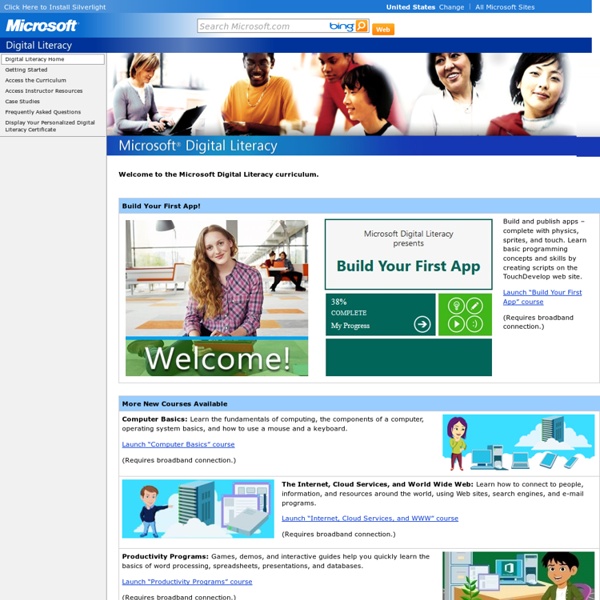Phoenix Public Library Programs
Library programs are free to the public. Search for programs at a location near you, sign up for program alerts, and more. Mon, Oct. 1, 2012 - Mon, Dec. 31, 2012 All Ages Library Hours English
Process - Digital Citizenship Scavenger Hunt
Directions: Click on the links and read the information presented, then answer the questions on the answer sheet about the link you visited. Digital Citizenship: 1.
Digital Literacy Definition and Resources
What is Digital Literacy? The ability to use digital technology, communication tools or networks to locate, evaluate, use and create information. 1The ability to understand and use information in multiple formats from a wide range of sources when it is presented via computers. 2 A person’s ability to perform tasks effectively in a digital environment... Literacy includes the ability to read and interpret media, to reproduce data and images through digital manipulation, and to evaluate and apply new knowledge gained from digital environments. 3
Basic Computer Skills Tutorial
Welcome to a short, easy-to-master, web based course on basic computer skills. Our goal is to give you a solid foundation. Once you have understood these basics, you will have a clear understanding on which to build your future knowledge of and skill with computers. To become acquainted with your computer there are certain basic skills to be mastered. While these skills might seem obvious at first, the fact is that many people never take the time to learn these very important basics.
9 resources for teaching digital citizenship
How can we teach kids to use technology responsibly when the technology is changing faster than we can keep up? How do we foster the values of good digital citizenship in students who are old enough to scoff at the “thou shalts” and “thou shalt nots”? Grappling with these questions is just the beginning of the digital citizenship conversation. Most educators recognize the need for it, but many are at a loss for how to teach it. Some have tried creative approaches and failed. In classrooms where digital citizenship is taught effectively, the teachers often share two things in common: They model ethical technology use for their students on a daily basis, and they naturally incorporate conversations about it whenever technology is part of their lesson plan.
What is digital literacy?
Digital literacy is the topic that made the ETMOOC learning space so irresistible to me… I think as educators we spout off about wanting our students to be digitally literate, but not many of us (myself included) have a firm grasp about what that actually means, and quite a number of us are still attempting to become digitally literate ourselves. Whatever that means. It turns out, defining digital literacy isn’t such an easy task. The etmooc community was fortunate enough to hear Doug Belshaw speak on this topic in a recent webinar. I’ve followed Doug on Twitter for quite some time, and it turns out his dissertation investigates just what is digital literacy… and his TED talk can be viewed here. Doug explained that digital literacy is quite ambiguous, and he doesn’t have all of the answers when it comes to defining these terms.
Free Software
[ Home | What's New | Public Pages | Tell Friends | Privacy Policy | FAQ | Help | About myHq ] Questions?/Suggestions?/Enquiries? Contact the webmaster@myhq.comv2.0 Last updated :- 02:57 11-17-2019 EST
How To Be A Google Power User - Infographic
Search engines are the backbone of everyday internet use, but are you aware of the hidden tips and tricks available to improve your search? Here are some pointers that'll save you Googling "How to Google." This infographic certainly added something new to a topic that we knew our client's target audience really cared about.




This website, run by Microsoft, serves as a great introduction to computers, their uses, and some basic digital literacy skills. by jenicomprispas Oct 30